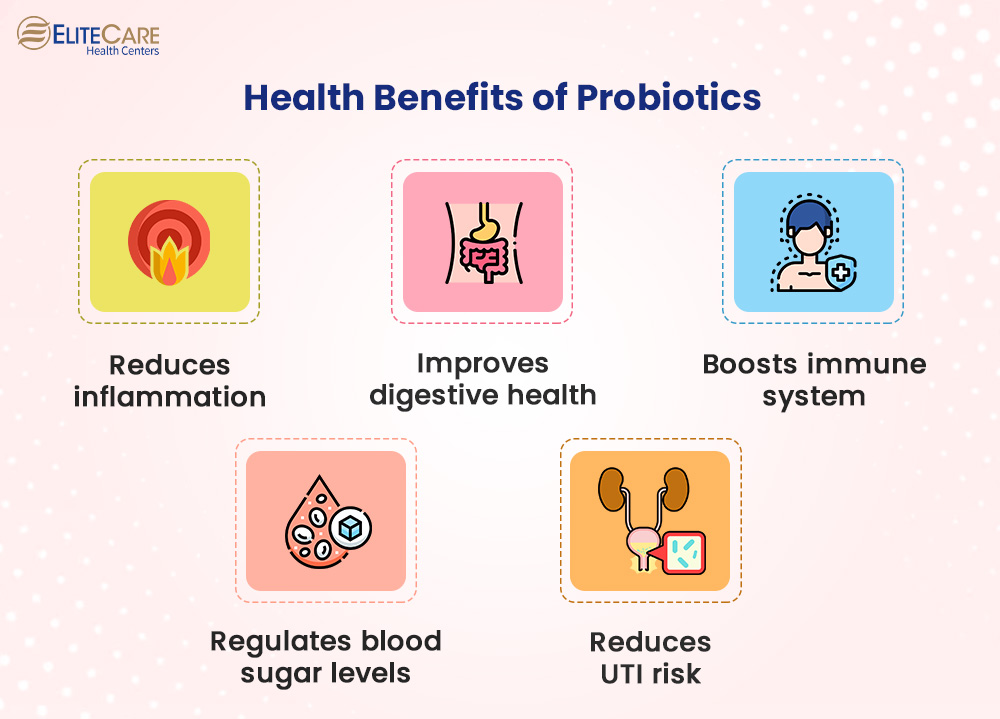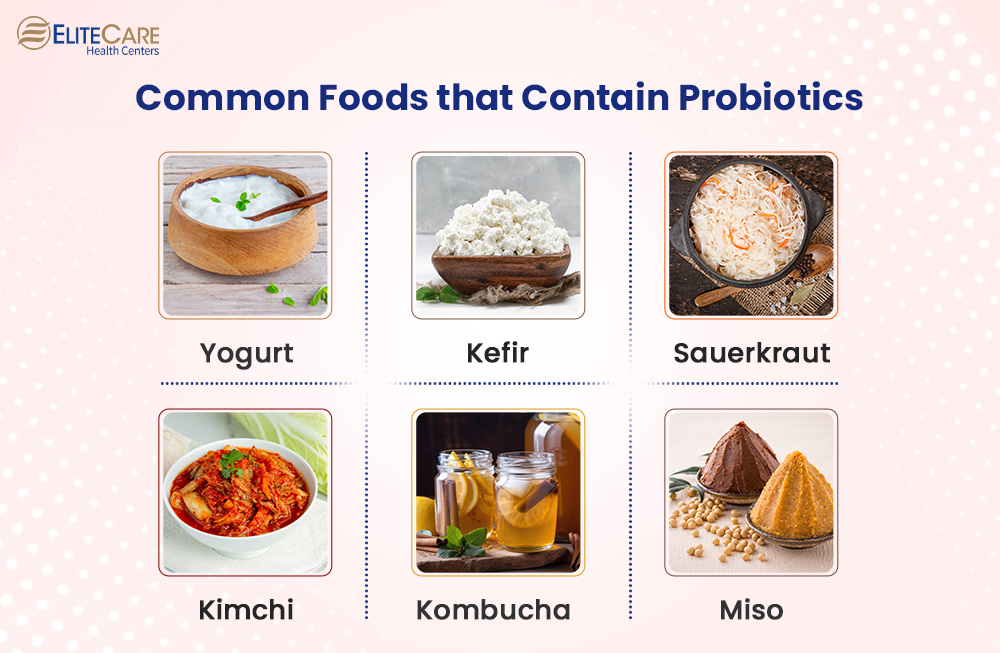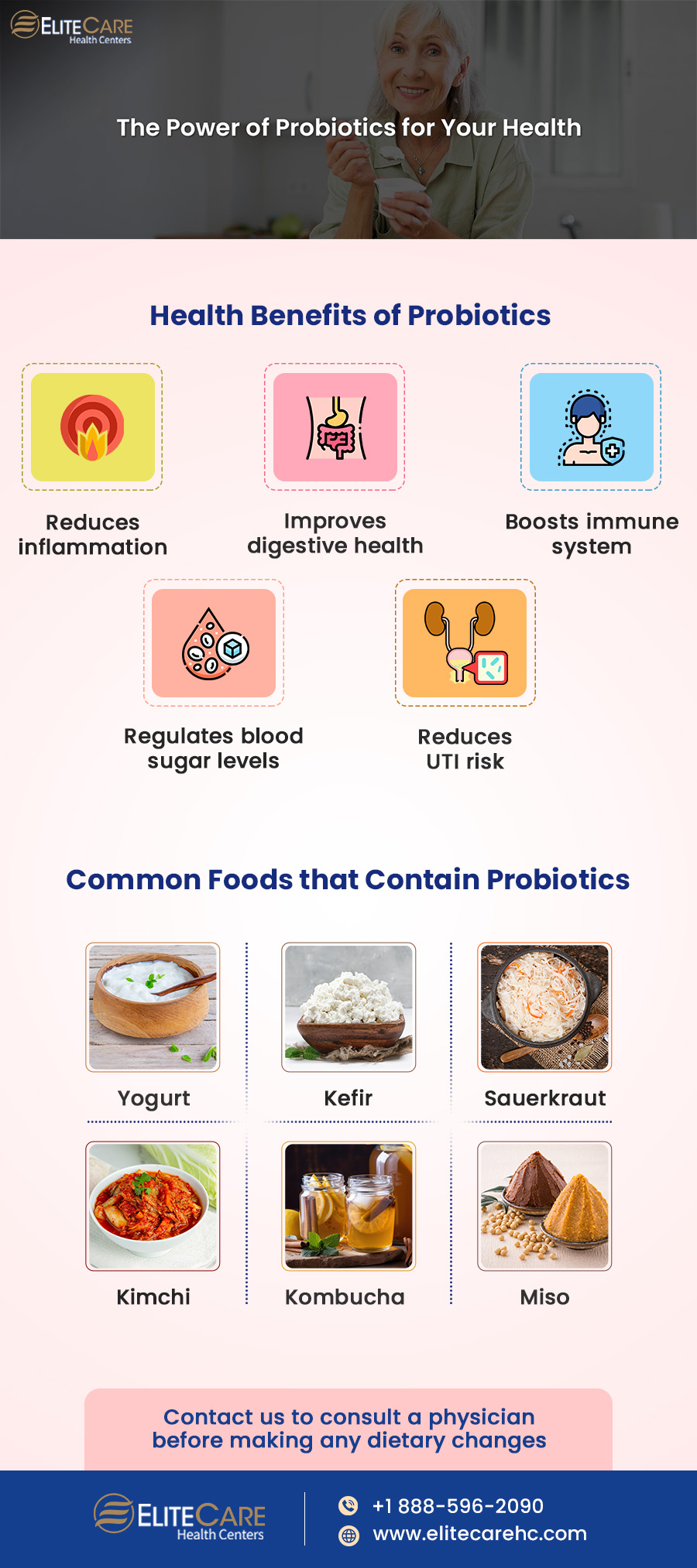
For the past few years, probiotics have been gaining attention with people being more aware of the importance of gut health. Probiotics are live microorganisms that come with a set of health benefits when consumed as prescribed. These microorganisms can include good bacteria, yeasts, etc., and they restore and maintain a healthy balance of bacteria in our gut microbiome.
In this blog post, we will share the potential health benefits of probiotics, the common foods that contain these microorganisms, and the side effects they may produce. Read on to learn more.
What Are the Health Benefits of Probiotics?

The following are some of the key health benefits of probiotics:
1. Reduces inflammation
Cytokines are signaling molecules that promote inflammation in the body. Overproduction of cytokines can increase inflammation in the body and lead to chronic diseases. Probiotics can help reduce inflammation by stimulating the production of anti-inflammatory cytokines. Therefore, it also helps reduce the risk of chronic diseases and improve mood and cognitive function.
2. Improves digestive health
Digestive issues often occur when the natural balance of bacteria in the gut gets disrupted by factors such as antibiotic use, stress, and poor diet. Probiotics can help restore balance and alleviate certain digestive disorders caused by inflammation such as irritable bowel syndrome (IBS) and inflammatory bowel disease (IBD).
In addition, probiotics can reduce inflammation in the gut and increase the functionalities of the intestinal barrier. Moreover, they also improve the absorption of nutrients in the gut, therefore, supporting overall digestive health.
3. Boosts immune system
Research has shown that a healthy gut can help build a stronger immune system. Probiotics foster the growth of good bacteria in the gut, improve gut health, and boost the immune system.
Besides, probiotics can also help reduce chronic inflammation and promote the production of antibodies. Therefore, it helps the body’s ability to fight infections and other foreign invaders.
4. Helps control blood sugar levels
Chronic inflammation can increase insulin resistance in the body and lead to type 2 diabetes. By reducing inflammation, probiotics may improve insulin sensitivity and help control blood sugar levels.
Probiotics also help in the production of short-chain fatty acids, which can also improve insulin sensitivity in the body. Moreover, some strains of probiotics may help reduce the absorption of glucose in the gut, therefore, lowering blood sugar levels.
Reduces the risk of UTI recurrence
When there is an overgrowth of certain harmful bacteria, such as E. coli, in the urinary tract, it can lead to Urinary Tract Infections. Some probiotics can help prevent the recurrence of UTIs by inhibiting the growth of these harmful bacteria. Additionally, probiotics also promote the growth of beneficial bacteria in the urinary tract and protect it from any foreign invaders. A study published in the Journal of Clinical Microbiology found that women who consumed the probiotic supplement had a 50% reduction in UTI recurrence.
However, it is crucial to note that not all probiotics are effective in preventing UTIs. Therefore, individuals should contact a healthcare center to consult a primary care physician and take supplements as prescribed.
Foods That Contain Probiotics

The following are some common sources of probiotics:
- Yogurt: It is perhaps the most well-known food source of probiotics. Incorporate yogurts that contain live and active cultures, as these are the strains of bacteria that provide the probiotic benefits.
- Kefir: It is a fermented milk drink quite similar to yogurt. Kefir contains a variety of probiotic strains and is also a good source of protein and calcium.
- Sauerkraut: It is made by fermenting cabbage in salt and water and is known as a good source of vitamins C and K as well.
- Kimchi: This Korean dish is made from fermented vegetables, usually cabbage, and is considered a good source of probiotics.
- Kombucha: This fermented tea contains a variety of probiotic strains and is also a good source of antioxidants.
- Miso: This Japanese seasoning is made from fermented soybeans and is known as a good source of probiotics.
To incorporate these foods into regular diets, individuals can try adding yogurt or kefir to their smoothies or enjoying them as a snack. The best way to have sauerkraut and kimchi is to use them as toppings for sandwiches or tacos. Individuals can enjoy kombucha as a refreshing beverage, while miso can be used to add flavor to soups and sauces.
The probiotic content of these foods may vary depending on how they are prepared and stored. To get the most out of these probiotics, read the labels and choose the products that contain live and active cultures.
Side Effects of Probiotics
While probiotics are generally safe for most people, some individuals may experience the following side effects:
- Gas and bloating
- Upset stomach
- Diarrhea or constipation
- Allergic reactions
- Headaches
- Skin rashes or itchiness
- Fatigue or weakness
Side effects from probiotics are not common, and most side effects are mild and go away on their own. Individuals with weakened immune systems, a history of digestive problems, and those who are on multiple medications should be more cautious before taking probiotics.
Always consult a primary care physician as well as a certified dietitian first. They can help determine if probiotics are safe and recommend the best type and dosage for individual requirements.
Conclusion
While probiotics generally have no severe harmful effects on the body, not all probiotics are created in the same way and may have different effects. Starting with simple probiotic-rich foods, such as yogurt, is an easy way to introduce these beneficial microorganisms into your diet. However, individuals should consult their healthcare provider for expert guidance on probiotic supplements. They can recommend the type, dosage, and timing according to individual health and preferences.
For any queries or concerns, contact EliteCare Health Centers, one of the best medical clinics in Florida that offers a wide range of senior care services. Contact us to schedule an appointment with our board-certified primary care physicians.






